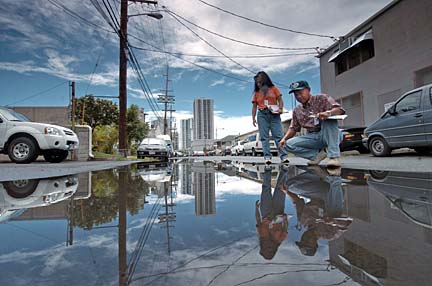

|
State hunting down mosquitoes
Through the back alleys and storm drains of Kakaako, state Department of Health workers were on a search-and-destroy mission yesterday for mosquito larvae that could potentially carry the West Nile Virus.
As summer -- and mosquito breeding season -- wanes on the mainland, Hawaii is making a final two-week push to ensure that the disease hasn't traveled here on a mosquito or bird, its two carriers, said Shokufeh Ramirez, the department's West Nile Virus coordinator.
Though 47 states have reported at least one case of West Nile Virus in a human this summer, Hawaii, Alaska and Washington state remain West Nile free -- and that's how Ramirez wants to keep it.
"No news is good news in this situation," Ramirez said.
So for the next two weeks, Health Department teams will be working hard to monitor mosquito-breeding conditions within a two-mile radius of the Honolulu Airport and Barbers Point and Honolulu harbors.
One team will visit businesses and residences, asking to check for standing water, the breeding place of the mosquitoes that can carry the disease. There is no punishment if standing water is found, Ramirez said, just state workers' help to get rid of it.
A second team is putting a mosquito-larvae-killing bacteria into standing water in storm drains. The bacteria is approved as safe for people and other animals and plants, Ramirez said.
There have been 1,386 human cases of West Nile Virus reported to Centers for Disease Control on the mainland this year and 45 deaths, Ramirez said.
The virus is a sometimes-fatal disease that is spread by the bite of an infected mosquito. While it usually circulates between mosquitoes and birds, it can be transmitted to people by a bite from an infected mosquito.
Hawaii health and wildlife officials hope to keep the disease from coming here, because the state's climate could allow year-round transmission of the disease. In addition to its risk to people, West Nile Virus could have severe consequences for native birds.
www.state.hi.us/health/